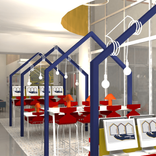Presentation
Our Interior Design diploma is awarded by AIPF-ESAIL and registered on the RNCP under number 41357 as a Level 6 Professional Certification in Interior Design. Whether for a two or three-dimensional space, museography, production or events promotions, an interior designer is a profession with the artistic, technical and creative expertise required to see a project through to completion. The broad range of sectors of activity, and the multitude of possibilities within each sector open to an interior designer, reveal a profession that is rich and diverse, and which opens up a huge scope for experimentation and innovation which constitute its strength and identity. EASIL proposes a three-year diploma in interior design which will allow you to master all the technical and graphic components of the profession. Students are admitted post-baccalareat (or equivalent) or via a recognition of prior learning and experience scheme. The ESAIL interior design program allows you to acquire the artistic and technical skills required to operate in the different sectors of activity associated with the profession. Learn to express your creativity working with experienced professionals throughout your interior design course on internships with companies!
Interior design
An artistic and technical education
Program Details
3 years
Full-time
Bachelor's degree (equivalent to Bac+3)
High school diploma or equivalent (VAE – Validation of Prior Experience)
Lyon
Level 6 professionnel certification - "Designer en espaces intérieurs"
The profession

In direct contact with their clients, the interior designer must have good listening skills and be capable of summarising the ideas expressed by their client to understand what they have in mind. They must also have a good command of drawing on paper or computer to be able to present a sketch or plan to the people they work with.
As a project manager, they should be able to suggest innovative spatial configurations. Furthermore, they must keep informed of the latest developments in the field in terms of materials, products, standards etc.
Finally, the interior designer is the main contact for the tradespersons and suppliers who will work on the worksites they are responsible for.
How to become an interior designer?
In order to practice this profession, you can take a three-year interior design course. This will involve studying a wide range of subjects including interior design, designing ephemeral spaces and events scenography. This course can lead to setting up as a freelance interior designer.
What does an interior designer or decorator do?
An interior designer’s job is to create the design of an interior space. They also have to manage the teams and suppliers working on the project.
Skills
Being an interior designer requires good listening skills and empathy to understand the client’s intentions and needs. They must be versatile, creative, methodical, curious, technical and have a breadth and depth of cultural references.
Testimony

Timeline
Stage de 6 semaines, 60 crédits ETCS.
- Dessin Académique
- Couleur et espace
- Perspective main levée
- Graphisme Histoire de l’Art
- Anglais
- Connaissance des matériaux
- Logiciels de CAO/DAO
- Codes de représentation
- Décoration intérieure
- Scénographie événementielle
- Aménagement d’espaces éphémères
- HEP On Boarding + Créativité
Notre formation de décorateur et décoratrice d’intérieur conduit à aborder en parallèle dès la première année les différents projets de conception dans le domaine de la Décoration. Trois secteurs professionnels sont étudiés : la décoration éphémère, la décoration intérieure, la scénographie événementielle. Il s’agit pour les étudiants de pratiquer ces différentes démarches de conception afin de s’ouvrir dès le début du cursus à des méthodologies spatiales différenciées.
Simultanément, les étudiants doivent rapidement acquérir différentes techniques graphiques de représentation, doivent également se constituer une culture dans le monde de l’Art et de la Décoration (y compris par le biais d’une langue étrangère), culture qui permettra d’élargir les champs d’investigation menés en Projet.
En plus des cours théoriques sur la décoration d’intérieur, l’année est ponctuée par la réalisation de 2 stages. L’un, de 2 semaines, auprès des entreprises de second œuvre du bâtiment, afin de donner des repères concrets sur les matériaux et visualiser des situations de chantier. L’autre, de 4 semaines, auprès de sociétés agissant dans le domaine de la décoration, où il s’agit de comprendre le fonctionnement d’une structure, les différents acteurs, les actions à accomplir, la relation aux clients, et de prendre un rôle dans l’activité de la structure.
Portfolio
The work presented is composed of partial extracts from the documents produced by students for their final exams. They show the skills acquired in interior design and interior architecture project design.
Lyon Campus
Originally located in the former military buildings at the Fort de Vaise (Lyon 9), the school has continued to develop to become one of the leading Interior Architecture schools in France. The Lyon campus is located in the Gorge de Loup area which is undergoing major development and offers excellent public transport links. The Lyon campus is spread across two buildings with a total surface area of 22,000m², housing 23 higher education establishments. The campus offers a full range of shared services and facilities including:
Modular rooms, an IT room, a model room, a learning resource centre, a large lecture hall, a business incubator, cafeteria and leisure spaces, with options for doing sport.